Casinos offer a range of casino options to players. The numerous games in the casinos encourage all forms of gamblers to test their luck and attempt to win big. Players have the potential to play games which they find the most enjoyable or in which they believe they are the luckiest.
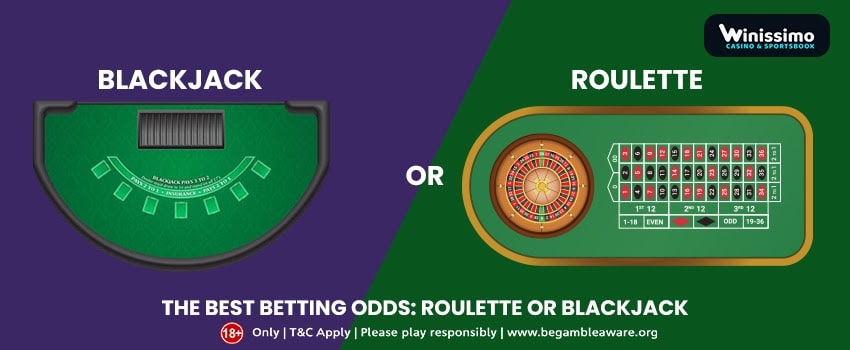
However, all skilled gamblers do not choose the games just because of these variables. To win at the casino consistently, gamblers select the games that give them the highest winning odds. Whether they go to a land-based casino or choose to play at a trusted platform like Winissimo, they get drawn to games that give them better odds. In other words, they choose the game that gives the house the least benefit, or house edge.
In every online casino, Blackjack and Roulette are two of the most common and most sought-after games. Both games also have staunch fans, aside from drawing occasional gamblers, who find it a point to get a few games daily at either the Blackjack or Roulette table.
After all, in Blackjack, if you defeat the dealer, you win the money you bet. The same remains true at the Roulette table with even-money bets.
What game has better odds, though?
A word that is sometimes used as a synonym for chance is “Odds.” To a degree, this is true, but it’s more complex than that.
You may express the likelihood of an occurrence in the form of odds. When a case has 2 to 1 odds, most people realize that there are 2 ways to lose and a single way of winning. Converting that to 1/3 or 33.33% is fast. But you can also describe the payout for a bet in aspects of odds. For starters, if you’re going to get paid at 2-to-1 odds, and you know that if you win, you earn $2 for every $1 you bet. And, if you’re betting on something with a 2 to 1 probability and a 2 to 1 payout, you’ll break even in the long run.
However, that’s not how casino games operate.
By paying off bets at odds that are lower than the odds of winning, the casino guarantees itself a profit. The differentiation between these odds is the edge of the house, and it is generally expressed in terms of a percentage.
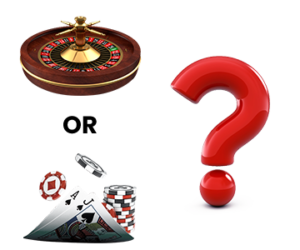
For Example:
You can quickly determine the odds of winning if you are playing a game where you randomly choose a marble from a bowl, and you win if you draw a black marble. What you need to remember is how many marbles are black, and how many are not.
Your odds of winning the bet are 3 to 1 if you have 3 white marbles and a single black marble. If the bet pays off at 2 to 1, then what is the edge of the house? In a potentially ideal set of 4 trials, let’s assume you bet $100.
You lose three times, at $100 each, with a cumulative loss of $300 each. You’ll win once, then you’ll get $200 in benefit. .Your net loss is $300-$200=$100. You get an average loss of $25 if you divide it by the number of bets (4).
This means that the edge of the house for this imaginary game is 25%. You’ll have to lose 25 cents over the long term on every dollar you bet. Casino games with a lower house edge are usually preferable to casino games with a higher house edge. But not all the time.
Blackjack
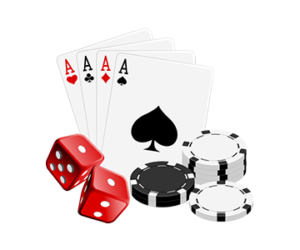
Blackjack is a card game that, in addition to getting luck on your hand, requires the use of strategic thinking. The game is not necessarily determined by the outcome of the gamble, but by the choices, you make based on the little knowledge you have.
The game’s object is straightforward. On a hand, the maximum possible value is 21, with aces being counted as 1 or 11, and face cards counted as 10, and all other cards counted by their numerical value. A player must have a better hand than the dealer to win Blackjack.
The dealer gives two cards to each player in each round and also gives two cards to himself, but with just one card face up. Players will then opt for either standing or hitting. Standing implies hanging on to their present hand when they are pleased with its worthwhile hitting implies telling the dealer to draw another card in the expectation of increasing the hand’s value. However, reaching 21 means the player busts or loses the round.
The dealer will then show the secret card and must hit before 17 points or greater are totalled by the cards, and the winner is decided by each hand’s final value. Bets usually pay 1:1, or 3:2 if a player gets a Blackjack, or a perfect 21.
Odds in Blackjack
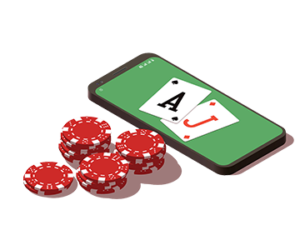
There is a gimmick of sorts in each casino game that gives the house its edge. The casino lets you play your hand out before they play their hand out in real money online Blackjack. If you bust, you automatically lose your bet. In a fair game, it will be called a draw, even though the dealer busts when it’s her time to play, you’ve already lost.
Even if you play perfectly, the chance of potentially winning a Blackjack hand is just 42%. Your chance will be 50% in a fair game. Despite this, if you play with great planning, the home advantage of the game is just around 0.5%.
Why is the edge of the house so low when the chance of winning a hand is so low?
It’s because you get a Blackjack, a 2-card hand that totals 21, once in a while. In that case, at 3 to 2 Blackjack odds, you get paid off. However, you just get the hand about 5% of the time, but it’s enough to chip some of the big house edge off the game.
Roulette
Roulette is a simple game based on bets that simply allows you to attempt to guess a certain result of thereafter the wheel spins the ball will fall, such as whether it will be on an odd or even number, on red or black, or on a single lucky number. You win if you have it right. Simple as that. In online Roulette, there is little decision-making, since you have virtually no data to deal with and any result is as likely to happen regardless of what happened in the previous round.
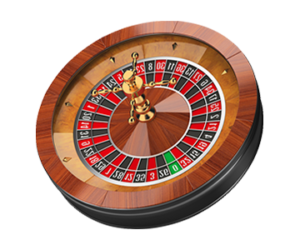
Odds in Roulette
The Roulette odds you have vary, depending on whether you’re playing European Roulette or American Roulette, since there is one green pocket or none in European Roulette, whereas there are two in American Roulette. For eg, if you play American Roulette and bet on red or black, you have a 47.% chance of winning for a 1:1 payoff, although you will be 48.60% likely to have it right in European Roulette.
How big payouts can be reached is one of the aspects that differentiates Roulette from Blackjack and other sports. For eg, a bet on a single number, which has a meagre 2.60% or 2.70% chance of occurring, can pay as much as 35 to 1. However, this comes at the expense of a 5.26% house edge on all American Roulette bets, while European Roulette has a 2.70% house edge that is marginally friendlier but substantial.
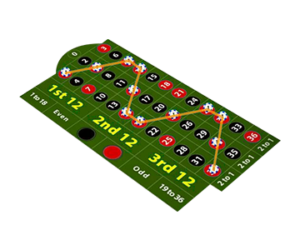
How does that equate to the 0.5% house edge in Blackjack?
Poorly, evidently.
Bet $100 on a 5.26% edge game, and each time you put the bet, you will lose an average of $5.26 over the long run.
Bet $100 on a 0.5% edge game and each time you put the bet, you will lose an average of 50 cents over the long run.
This is the question here:
Under that case, would you like to lose $5.26 or would you like to lose 50 cents?
The solution seems simple, but this little math dilemma has more to it than you would expect.
The average hourly loss concept in casino gambling
- To predict how lucrative a game would be, casinos use a straightforward formula. They multiply the average size of their bet by the number of bets the average makes every hour. This gives them the game’s typical hourly activity. If you multiply the house edge by the average hourly activity, for the game you get the estimated loss every hour.
- 100 bets per hour are made by an average Blackjack player. (This depends upon how many players are at the table, how swift the dealer is, and how easily decisions are taken by the player.) If you expect a bet of $5 per hand, $500 is the average hourly movement for that player. For a 0.5% house edge, that’s an expected $2.50 per hour loss.
- The typical Roulette player makes 50 bets an hour, but depending on how fast the croupier is and how many players are at the table, this often depends. If you think $5 per wheel turn, the player’s average hourly action is $250. The estimated projected hourly loss for Roulette is $13.15 with a house edge of 5.26%.
- You would assume the overall loss to be 10 times as much as the edge of the house is 10 times more. But just because the average hourly action is smaller, it’s not 10 times greater. It’s not so poor as to make the same sort of deal with the games. And when you adjust to the slower tempo of the game, Blackjack always has stronger odds than Roulette.
What among different Roulette variations?
- European Roulette can be found with just a single 0 on the wheel. This lowers the edge of the house to 2.7%. The estimated loss per hour has fallen to $6.75. That is still not equivalent to the Blackjack table’s projected loss of $2.50, but it’s near.
- However, you’ll find more variants. You have an alternative called “en prison” in some European Roulette games. This is only available on even-money bets, and this is how en prison works:
- You don’t forfeit your bet automatically when you bet on black and the ball lands on red or green instead. It goes to prison until it gets the next bet. You forfeit your bet if you lose on the 2nd bet. Otherwise, with no wins, it’s returned to you.
- This again breaks the edge of the house in half, to 1.35%. The estimated loss per hour decreases by half to $3.38, too. That’s no closer than it was to $2.50, but Blackjack still has a better shot.
What about variants of the Blackjack rules?
- The hold percentage is slightly more than 0.5% (the sum that the casino currently makes on Blackjack). In certain casinos, it is closer to 2.5-4%.
- That’s because the house edge of Blackjack believes that on each side you are making the mathematically appropriate decisions. You may as well play Roulette if you don’t grasp the simple technique for Blackjack.
- Any Blackjack tables often pay off just for a natural at 6 to 5. The casino contributes more than 1.5% to its edge in that situation. You can pass on 6 to 5 Blackjack games, and you might as well play Roulette if you play them.
- Also, bear in mind that to gain that edge, Roulette doesn’t need you to make wise decisions. You’re just putting your money and taking your chances.
Which game has better odds?
Online/live Blackjack is the game to play from a pure odds point of view if you want to stop contributing the cash to the casino. You manage the odds in Blackjack and can also give yourself an edge often, thereby making it more likely for you to win fairly frequently. However, this would cause you to think more critically and might even take the fun out of playing.
On the other side, while online/live Roulette offers a big benefit to the house, it’s a game you can play almost brainlessly, so you just have to rely on sheer luck. This may be exciting, but you need to assume something to lose.
Ultimately, while Blackjack has the best odds of any casino game, depending on your priorities and the sort of experience you want to have, you can pick the game you want to play.
